News
-
15/12/2022Iberdrola and UNICEF launch an international alliance for the training and employment of young people in situations of vulnerability Iberdrola and UNICEF today presented an innovative alliance with social impact aimed at contributing to the social and labor inclusion of young people and promoting the generation of training and employment opportunities, both in Spain and internationally. Iberdrola is contributing 3 million euros over the next three years to the alliance, which will be implemented together with other social entities. The challenges facing young people around the world today have prompted the two organizations to pool their knowledge, experience and innovative capacity to offer them training and employment opportunities in sectors related to the green economy, which have growth prospects. These challenges facing young people around the world today are not minor. Some 270 million of the world's 1.8 billion young people between the ages of 15 and 24 have no access to education, employment or training, and two-thirds of them are women. In addition, 75% of young workers work in the informal economy. "With this alliance we are responding to the challenge of generating employment opportunities for vulnerable young people in sectors of the future, such as clean energy, which will allow us to achieve a more sustainable and prosperous world for everyone," said Iberdrola's Executive Chairman, Ignacio Galán. "Every young person must have the opportunity to develop personally, professionally and vitally, especially those who find it most difficult. This is the only way to make social progress sustainable and inclusive. Through this alliance, we will increase the options for these young people to progress and reach their full potential, joining forces with Iberdrola, whom we thank for their commitment," said the president of UNICEF Spain, Gustavo Suárez Pertierra. Thus, young people will be the protagonists of the alliance by strengthening their empowerment and their personal and professional development while committing themselves to the changes that society and their communities need in terms of sustainability. These initiatives will be key to the economy, creating quality and skilled jobs Scope of the international partnership With this alliance, Iberdrola becomes a promoter of Generation Unlimited , a global initiative launched by the United Nations General Assembly in 2018 and led by UNICEF that seeks to connect millions of young people around the world with opportunities for training, empowerment, employment and social entrepreneurship. Within this framework, Iberdrola's alliance in favour of UNICEF will focus on Brazil, promoting the 1Million Opportunities (1MiO) programme, whose objective is the inclusion of vulnerable adolescents and young people in the country's labor market, strengthening their skills, job opportunities and green employment. Likewise, support will be given to the UPSHIFT innovation programme that UNICEF is implementing in Somalia, which seeks to train adolescents and young people who are victims of violence and at risk of exclusion in innovation and social entrepreneurship. Furhermore, under the conviction that the social progress of young people will be linked to sustainable solutions and projects based on the energy transition, the alliance aims to encourage the commitment of young people to climate action. In this regard, Iberdrola will provide digital content on climate change and sustainability to 'Learning Passport', UNICEF's global learning platform that enables continuous access to quality education for children and young people around the world. Scope of the national alliance At the national level, Iberdrola will support the landing of Generation Unlimited global with 'Generation Unlimited España', a new multi-stakeholder alliance promoted by UNICEF Spain to promote the social and labor integration of adolescents and young people in highly vulnerable situations in our country. This multi-stakeholder alliance will involve, in addition to Iberdrola, other actors from the private sector, the public sector and civil society, such as Comillas Pontificial University. Iberdrola is playing an active role in the design of innovative training models that offer young people market-oriented skills for the energy transition. These models are implemented in collaboration with social entities - Asociación Cesal, Federación de Plataformas Sociales Pinardi, Fundación San Juan del Castillo-Pueblos Unidos, Fundación Santa María la Real, Fundación Secretariado Gitano, Fundación Tomillo, Asociación Norte Joven - that work directly with young people, promoting the opportunities offered by the green economy. Also in Spain, the alliance between Iberdrola and UNICEF will promote training on climate change and sustainability in formal education, incorporating a children's rights and exchanging educational and training proposals with teachers. READ MORE
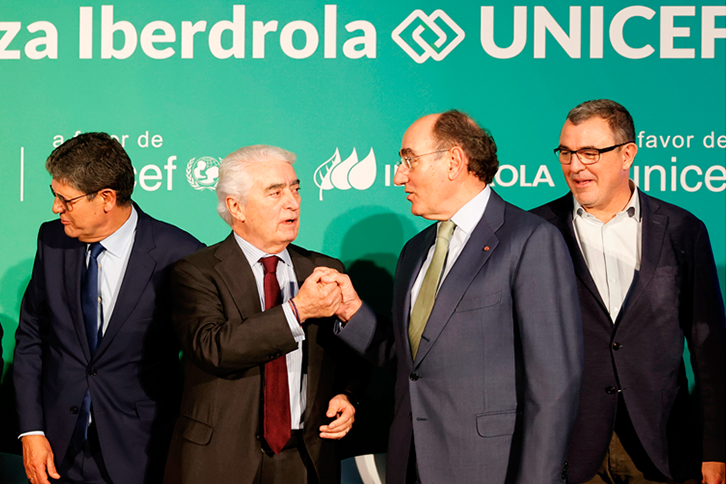
-
14/12/2022Skateboarding down the La Magdalena wind farm Iberdrola has challenged Spanish rider Alejandra Cárdenas, one of the best downhill riders in the world, to cross at full speed one of its pioneering wind farms in Castilla y León, specifically in the province of Burgos, - La Magdalena - whose wind turbines rise up to 55 metres, with a gradient of up to 20% at some points. During this challenge, Alejandra reached up to 70km/h, demonstrating great control thanks to her experience of more than 20 years on the board. The video of this descent accumulated tens of thousands of likes on Iberdrola's profiles on the social networks Tiktok; Instagram; Linkedin; Youtube; Facebook and Twitter. Downhill is, as its name suggests, a modality that consists of descending a mountain at full speed, in this case on a skateboard. Unlike other vehicles, these skateboarders brake by skidding on the curves, defying the laws of physics and crossing the board at 90 degrees, in such a way that they manage to lose speed and even brake in a matter of seconds. Alejandra is one of the few women in Spain who practises this sport and has travelled all over the world to be able to skate, winning several championships. It is a sport that until now has been known by very few, but which is beginning to gain momentum thanks to the triumphs of Spanish athletes, such as the recent world champion, Diego Poncelet. The Iberdrola group has been promoting women's sport since 2016 . Currently in Spain, its support reaches 600,000 women, more than 100 competitions and 32 federations, including skating, to which Alejandra Cárdenas belongs. In 2004, Iberdrola commissioned the La Magdalena wind farm in the province of Burgos, in the Merindad de Valdeporres, comprising 28 wind turbines with a total installed capacity of 23.8 MW, whose average annual production enables it to supply clean energy to a population equivalent of more than 13,000 homes. A new energy landscape that fixes population in rural areas Iberdrola promotes renewable energies as an engine for rural development and in this way the villages emerge as a guarantee for the future. This is the case of the villages of Castile and Leon, surrounded by wind farms and photovoltaic plants that Iberdrola is promoting and which will contribute to a sustainable recovery, allowing the creation of local employment. Iberdrola has begun construction of the Valdemoro and Buniel wind farms, the latter with the world's most powerful onshore wind turbines manufactured by Siemens Gamesa - the first 5.X platform equipment in Spain. In the province of Burgos alone, it has recently built or is developing more than 550 megawatts between seven wind farms. READ MORE
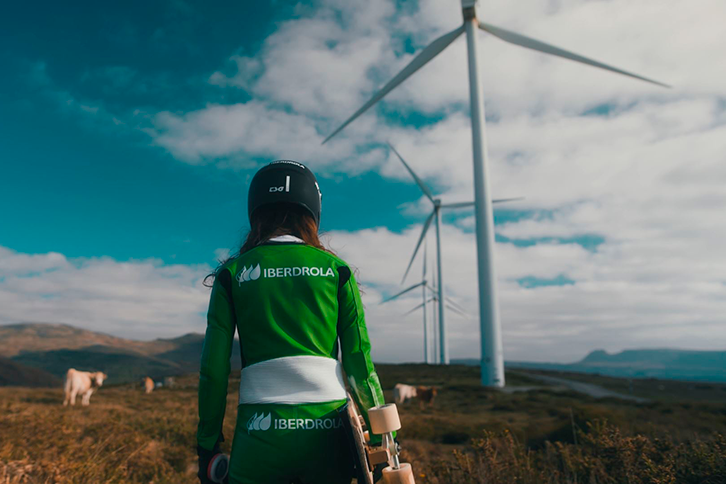
-
13/12/2022We maintain our top score in the world's most prestigious climate change index, CDP Iberdrola maintains its commitment to decarbonisation. The company has remained on the most prestigious climate change index in the world, the CDP, with the highest score. The group chaired by Ignacio Galán has been included in CDP's A List 2022, thanks to its work in dissemination, awareness, management and, finally, environmental leadership. This ranking measures the completeness of disclosure, awareness and management of environmental risks and best practices associated with the environment, such as the setting of ambitious and meaningful targets. CDP manages the global disclosure system for investors, companies, cities, states and regions to manage their environmental impacts. CDP is regarded by the world economy as the gold standard for environmental reporting and has the richest and most comprehensive data on corporate and city actions. Iberdrola already has more than 39,000 megawatts (MW) of renewable capacity installed worldwide and expects to exceed 80,000 megawatts by 2030. In addition to this, the group is included in the main international sustainability indices, including the Dow Jones Sustainability Index , MSCI, Sustainalytics, Bloomberg GEI, Euronext Vigeo Eiris indices, Global100, EcoVadis, etc. Contribution to the Sustainable Development Goals (SDGs) Iberdrola has incorporated the Sustainable Development Goals (SDGs), defined by the United Nations for the 2030 horizon, into its business strategy and sustainability policy, and is a benchmark for its direct contribution to the global goals, highlighting its contributions in the field of energy and climate change. The company focuses its efforts on the provision of affordable and clean energy (goal 7) and climate action (goal 13), while contributing directly to ensuring clean water and sanitation (goal 6), has increased its investment in R&D&I activities (goal 9), promotes respect for the life of terrestrial ecosystems (goal 15) and works to build partnerships to achieve the goals (goal 17). Anticipating the current energy transition by 20 years, the Iberdrola group has committed to invest €47 billion between 2023 and 2025 to drive the energy transition, employment and net zero emissions. Iberdrola continues to make progress in its commitment to energy self-sufficiency and in its proactive role as an active agent in the fight against climate change. In fact, as part of the Strategic Plan, the company intends to make its growth in renewables and grids compatible with the goal of becoming carbon neutral by 2030 in its generation plants and own consumption, and in all its activities by 2040. Iberdrola will also have a net positive impact on biodiversity by 2030. READ MORE
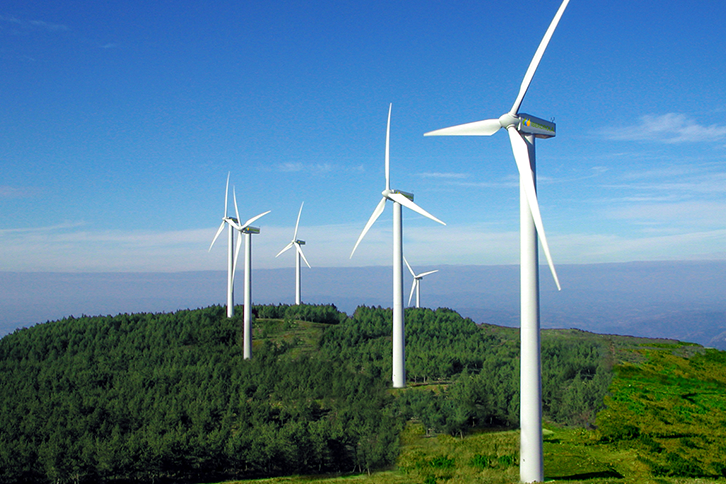
-
12/12/2022We presented our plan to achieve positive impact by 2030 at the World Biodiversity Summit in Canada Iberdrola has set itself the goal of achieving a net positive impact on the ecosystems and species where it operates by 2030. The new Biodiversity Plan was presented by Emilio Tejedor, the company's environmental director, at the World Biodiversity Summit (COP 15) currently being held in Canada. This new Biodiversity Plan establishes the necessary mechanisms to ensure that its activity contributes, by the end of this decade, to generating better environmental conditions than those that existed previously. For Emilio Tejedor "Iberdrola's Biodiversity Plan is a continuation of the path set since 2007 with the approval of its first Biodiversity Policy. This plan complements the company's Climate Action and Circular Economy plans, which address decarbonisation and the sustainable use of resources for the comprehensive protection of the nature that surrounds us and on which we vitally depend". The preservation of nature and the well-being of people are priority elements in the company's business model. In this sense, we are facing an unprecedented environmental crisis, in a scenario characterised by a strong growth in global energy demand, and we are therefore working to build an energy model in harmony with nature and human beings as a source of sustainable development. The Biodiversity Plan - which is aligned with the 2050 Vision of the Convention on Biological Diversity - establishes three main lines of action. The first of these establishes a pioneering accounting framework for quantifying the positive and negative impacts on ecosystems and species arising from the construction, operation and decommissioning of facilities. In this way, the company will be able to monitor the degree of compliance with its objective and review its biodiversity action plans to ensure their achievement. The second line of this plan establishes the need to intensify biodiversity conservation and regeneration actions in order to achieve this ambitious goal. To this end, Iberdrola has set a goal for 2025 to evaluate and review the action plans of the assets of all of its technologies considered to be a priority due to their degree of impact or strategic importance. The 2030 target contemplates the review and creation of plans for 100% of its facilities worldwide. Finally, the Biodiversity Plan includes the need to drive systemic change through action for biodiversity, the promotion of research into conservation, restoration and regeneration solutions, as well as the transmission of knowledge to achieve the necessary cultural transformation. Iberdrola thus intends to be a driving force for this change, integrating biodiversity into all of the group's internal strategic planning and decision-making processes. This roadmap reinforces the company's commitment to the conservation of ecosystems and its commitment to making the supply of competitive, clean and sustainable energy fully compatible with environmental balance. Biodiversity protection actions Iberdrola annually carries out more than 750 actions to protect biodiversity, combining the development of renewable and grid projects with the conservation of the diversity of flora and fauna and the care of natural heritage. These actions are integrated into programmes to promote the conservation and restoration of ecosystems and species, impact prevention and mitigation plans, and initiatives to improve knowledge through research and collaboration with stakeholders. All of these actions are detailed in the "Biodiversity Report", which Iberdrola periodically publishes. These include the 'Tree Programme ', focused on promoting biodiversity through the conservation and restoration of forest ecosystems, through which the company has already planted more than 2.3 million trees in seven countries in the last two years. This initiative, launched in 2020, aims to plant and conserve up to 20 million trees in the coming years around the world. It is also worth highlighting the conservation actions in more than 18,000 ha of different Brazilian biomes, mostly in the Amazon rainforest, and the restoration of more than 9,500 ha of degraded peatlands in management plans in the United Kingdom, favouring the populations of birds of prey and wading birds. In the protection of species, an example to highlight is the conservation agreement that the company has created in the United States for the conservation of the Monarch Butterfly, whereby vegetation management strategies are carried out in an area of approximately 4,000 ha in its distribution networks, creating an ideal habitat for its conservation. The company is also working on the implementation of innovative measures to improve our interaction with species, such as the installation of cameras in wind farms which, when they identify a protected bird, emit sounds so that it deviates or directly activate the wind turbine to stop, as well as the painting of one of the blades or the installation of vinyls in the shape of an eye as deterrent measures. Another measure that minimises the impact on the ornithological community is the effort made to improve the aerial network: in Spain alone, more than 80,000 pylons have been adapted and in the United States more than 24,000 have been replaced. Iberdrola conducts numerous research projects that, in addition to being the basis for planning measures to prevent or reduce impacts, in many cases have helped to fill gaps in knowledge and enhance the value of certain ecologically important areas. This is the case of offshore wind projects in which, with respect to the ecology of birds and marine mammals, innovative studies have been conducted within the framework of innovative R&D projects. Also noteworthy are the projects that Iberdrola carries out through its foundations with various stakeholders, such as the Coralizar Project in Brazil in collaboration with WWF, which works to restore corals in an area of 4,400 hectares of reefs, researching new methodologies and promoting knowledge, awareness, and benefits for the community. Other significant initiatives are the Migra project in Spain or the Flyways project in Brazil focused on bird conservation, and initiatives to support indigenous communities, among others. The culture of biodiversity protection is also evident in the more than 12,000 Iberdrola volunteers who have participated in various actions related to biodiversity conservation over the past two years throughout the world. READ MORE
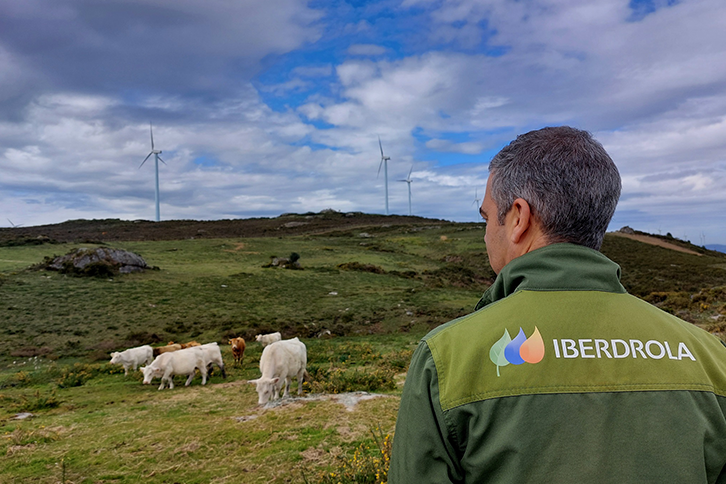
-
10/12/2022We are the only European utility to be included in all 23 editions of the Dow Jones Sustainability Index Iberdrola has once again been included in the Dow Jones Sustainability Index (DJSI), making it the only European utility that has been present in the index during its 23 editions. This is reflected in the annual update published by S&P Dow Jones Indices and RobecoSAM, responsible for its preparation. This demonstrates the group's firm commitment to the highest environmental, social and corporate governance standards, since, from an initial universe of some 10,000 companies, only 10% of the listed companies with the best sustainability scores are finally selected. This evolution is the result of a model based on sustainable development, which has led Iberdrola to become a world leader in renewable generation, with more than 39,200 megawatts (MW) of renewable energy installed and an emission-free electricity production of more than 80% by the end of the third quarter of 2022. In this edition, the company also stood out in aspects such as innovation, stakeholder relations, market opportunities, risk management, environmental management and water. In addition to the Group's inclusion in this index, it has also achieved a high score in the main international sustainability indices, including Moody's ESG, CDP, MSCI, FTSE4Good, Sustainalytics, ISS-ESG, Bloomberg GEI, Euronext Vigeo Eiris indices, Global100, EcoVadis, etc. Leading in sustainability Iberdrola has incorporated the Sustainable Development Goals (SDGs), defined by the United Nations for the 2030 horizon, into its business strategy and sustainability policy, and is a benchmark for its direct contribution to the global goals, highlighting its contributions in the field of energy and climate change. The company focuses its efforts on the provision of affordable and clean energy (goal 7) and climate action (goal 13), while contributing directly to ensuring clean water and sanitation (goal 6), has increased its investment in R&D&I activities (goal 9), promotes respect for the life of terrestrial ecosystems (goal 15) and works to build partnerships to achieve the goals (goal 17). After anticipating the current energy transition by 20 years, the Iberdrola group plans to invest 150 billion euros by 2030, and thus remain at the forefront of the energy revolution facing the world's leading economies. The company is moving forward with its historic 47-billion-euro investment plan during the period 2023-2025 and consolidating its business model, based on more renewable energies, more grids, more storage and more intelligent solutions for customers. In this way, by 2030 Iberdrola will have surpassed 80 gigawatts (GW) of renewable capacity and doubled its regulated asset base to 65 billion euros. READ MORE
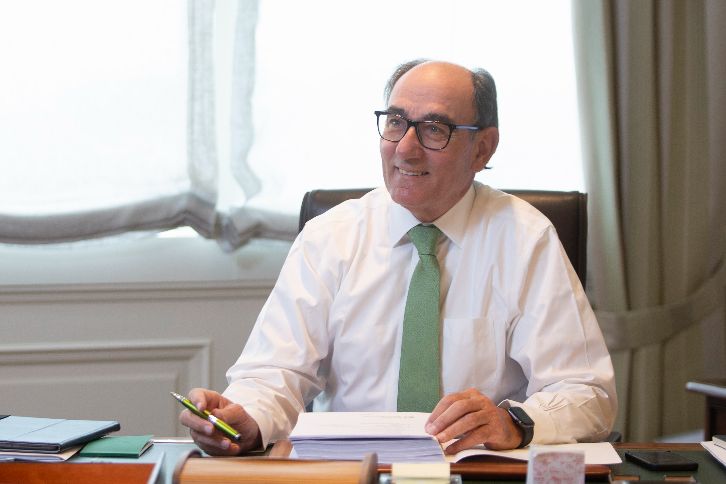
-
07/12/2022Galán reaffirms Iberdrola's investment commitment to renewable energies in Portugal Iberdrola has reaffirmed its commitment to clean energy in Portugal and announced that it will accelerate its investments to expand the country's renewable capacity during a meeting today between the Prime Minister of Portugal, António Costa, and the executive chairman of the Iberdrola Group, Ignacio Galán. Ignacio Galán ratified the company's plans to support the energy transition in this country, where Iberdrola already has projects under construction that will enable it to triple its photovoltaic capacity by 2023. Thus, by the end of next year, the group's investments in Portugal will exceed 2 billion euros. In addition, the company plans to allocate 3 billion euros in the coming years to solar, wind and storage projects, as well as new solutions such as green hydrogen. The meeting took place at the Alcochete I and II solar plants (46 MW), in the district of Setúbal (Lisbon region), whose construction, which has just been completed, took just eight months. The complex, located in the town of the same name, involved an investment of around 40 million euros and generated up to 180 jobs during its construction, most of which were filled by local workers. These parks have bifacial solar modules, which increase energy production by up to 30% compared to traditional panels because both sides of the panel are able to absorb the sun's energy. In addition, bifacial cells reduce the average cost of electricity by 16%. The plants also have a tracking system that allows the modules to move according to the path of the sun, thus maximising energy capture and extending the useful life of the plant by reducing degradation. When they come into operation, Alcochete I and II will supply enough green energy to meet the needs of 26,400 households for a year, which is more than the total population of the municipality of Alcochete. Portugal, a model for advancing energy self-sufficiency During the event, António Costa announced the new SIMPLEX permitting procedures to encourage the rapid deployment of clean energy. The incorporation of these procedures into the SIMPLEX programme to streamline and modernise the administration aims to accelerate the response to the double challenge posed by the climate and energy crisis in Europe. In this sense, Ignacio Galán insisted on accelerating the implementation of the European Green Pact and the EU's REPower package. "Thanks to the impetus of the European Commission, valuable decisions have been taken in recent months. But it has also become clear that all Member States must work in a coordinated way to complete the single energy market in Europe", he said. Iberdrola's chairman highlighted the stability of the regulatory outlook in Portugal and the dynamic approach to permitting processes as the key factors behind Iberdrola's commitment to grow its operations in the country. "The measures announced in recent months by Prime Minister Costa's government and the new initiatives underway show Portugal's clear leadership. This effort must also be shared by companies. And therefore, in response to its clear and stable regulation, Iberdrola wants to take a further step in its commitment to Portugal and its citizens", added the company's chief executive. Long-term investor in Portugal's energy transition This is the second meeting between António Costa and Ignacio Galán in the last six months, following the inauguration of a mega pumped hydroelectric plant in Alto Tâmega, northern Portugal. The group is planning to build a wind power complex linked to this facility, which will turn the complex into a hybrid generation plant, which, with its 400 MW of installed capacity, will be one of the largest wind power projects in Portugal. The Tâmega gigabattery , the largest clean energy initiative in the country's history with an investment of more than 1.5 billion euros, has three dams and three power plants (Gouvães, Daivões and Alto Tâmega) and a storage capacity of 40 million kWh, equivalent to the average daily energy consumption of 11 million people. In addition to the Alcochete solar complex, Iberdrola has completed two other photovoltaic facilities in the Setúbal district: Conde, with 13.5 MW, and Algeruz II, with 27 MW. Construction of the remaining plants awarded to the company in the 2019 auction will begin in early 2023. Specifically, the 37 MW Montechoro I and II projects in Paderne (Albufeira) and the 64 MW Carregado project in Alenquer (Lisbon). On the other hand, the 84MW Estoi solar plant (Algarve), which also includes battery storage and which corresponds to the 2020 auction, will come on stream in 2024. Iberdrola already operates 92 MW of wind power in Portugal, spread over three wind farms: Catefica, in the municipality of Torres Vedras, with 18 MW; Alto do Monção, in Mortágua and Tondela, with 32 MW; and Serra do Alvão, in Ribeira de Pena, with 42 MW. Together, these plants produce 200 GWh per year, equivalent to the electricity used by 35,000 households. 3,000 new solar MW on the Iberian Peninsula The Iberian Peninsula has great potential for the future supply of clean energy in the European Union. Plans to reduce dependence on fossil fuels represent a great opportunity for a territory with significant sun and wind resources. Iberdrola, which has consolidated its position as the leading promoter of photovoltaic solar energy, is currently developing projects totalling more than 3,000 MW of new photovoltaic capacity, almost equally divided between Spain and Portugal. In this way, the company will almost double its installed capacity of this technology, which currently exceeds 2,330 MW on the Iberian Peninsula, almost all of which is located in Spain. The Iberdrola group began its commitment to renewable energies more than two decades ago as a fundamental pillar on which to build its clean, reliable and intelligent business model. Thanks to this vision, the company is spearheading the energy transition towards a low-emission economy and is today a world leader in renewable energies, with more than 39,000 MW of renewable capacity installed worldwide. Between 2023 and 2025, the company will invest around 17 billion euros in renewable energies in secured, high-quality projects. Of these, 24% will be allocated to photovoltaic initiatives. READ MORE

-
05/12/2022We are doubling our investment in R&D&I, to reach €4 billion by 2030 Iberdrola takes another step forward in its commitment to innovation. The company aims to exceed €4 billion of investment in Innovation, Development and Research (R&D&I) activities by 2030. Thus, it will double its investment in this area by the end of the decade. These resources are intended to be used primarily for projects related to renewable energy, smart grids, digital transformation, green hydrogen and the development of tailor-made solutions for our customers. The aim is to accelerate the energy transition by addressing not only the climate crisis, but also by improving energy security, competitiveness and sustainable job creation throughout the value chain. Through the incorporation of new clean and efficient technological solutions, the company has become the driving force behind the transition towards a sustainable, competitive and safe energy model based on electrification. In fact, Iberdrola, which is the private utility in the world that invests the most in R&D&I -according to data from the report 'The 2021 Industrial Investment Scoreboard' prepared by the European Commission-, has allocated €2 billion in the last decade. In 2021, Iberdrola invested 337.5 million in R&D&I, 15% more than in the previous year, and the number of innovation projects underway totals 250. The strategic plan until 2025 presented on 9 November envisages that investment will rise to 420 million that year and reach 550 million per year in 2030. Its R&D&I strategy is also included in its Innovation Report 2020-2022 , recently published by the company. Walking in innovation for the energy transition As a result of this effort, the company has spearheaded the development of solutions that drive decarbonisation such as smart grids, with initiatives such as the Global Smart Grids Innovation Hub . Located in Bilbao, the centre has become an international benchmark and will provide a response to the challenges of the energy transition. The centre acts as a driving force for innovation, combining the company's technological capacity with that of more than 80 collaborating entities and companies: suppliers, universities, technology centres and start-ups. It will also serve to attract strategic suppliers and international talent, thus strengthening the business ecosystem. The Hub has already identified more than 120 projects worth 130 million euros for the development of grid digitalisation solutions, integration of renewables, deployment of electric vehicles and energy storage systems. In the area of networks, it also continues to incorporate digitalisation and artificial intelligence systems in transmission and distribution infrastructures in order to further increase security and quality of supply. In renewables, it is worth highlighting the boost given in recent years to offshore wind energy, of which it already has assets in operation and under advanced construction in the United States, the United Kingdom, France and Germany, and has others under development, both fixed and floating, in these same countries and also in Sweden, Poland, Norway and Japan. The company is also committed to pumped hydroelectric storage, a technology in which it has recently inaugurated the Tâmega gigabattery, one of the largest projects in Europe in the last 25 years; or to promoting new uses for electricity, such as the production of green hydrogen, a new energy vector in which Iberdrola already has the largest plant for industrial use on our continent. In addition, the company is fostering a culture based on creativity. To this end, the Innovation and Training Campus , a 180,000 m2 complex with state-of-the-art facilities in San Agustín del Guadalix (Madrid), has become the company's global centre for knowledge, innovation and employability. With close to 13,000 people receiving training in its classrooms every year, it represents Iberdrola's commitment to technology, R&D, and collaboration with technology centres as levers to lead the energy transition, the green recovery of the economy and employment, and the employability of young people and senior professionals in sectors of the future. The company has also continued to launch new competitive and smart products and services for customers, integrating technologies such as blockchain, Big Data and Artificial Intelligence. Through self-consumption solutions, energy management, electric vehicles and heat pumps, Iberdrola enables customers to minimise the cost of their bills and their environmental impact while optimising comfort and maintaining control over their energy options and choices. Iberdrola, with energy start-ups This year, Iberdrola celebrates 15 years of innovation in the energy sector through its PERSEO start-up programme . This has helped the utility to launch innovative solutions to promote renewable energies, decarbonisation and electrification of the economy, digitalisation of grids, promotion of efficient storage and care for the environment. The initiative, with eight companies currently in the portfolio, has created a global ecosystem of start-ups over the years with an investment of more than €100 million. PERSEO's last major milestone was last May, when it created Andromeda, the first large technology venture capital fund with specific sustainability objectives. The fund, which aspires to have a size of €300 million, was born, in addition to Iberdrola, with public participation through the ICO Next Tech Fund, with that of Nortia Capital and Seaya Ventures, which is in charge of its management. The programme's ecosystem includes more than 7,500 startups, including unicorns - companies valued at more than $1 billion - such as electric vehicle charging solutions manufacturer Wallbox. Pilot projects give start-ups access to large volumes of data and real energy assets by testing their technologies in a real-world environment, while at the same time offering investment to start-ups with the highest growth potential. These two formulas provide insight into the market and access to key technologies first-hand. READ MORE
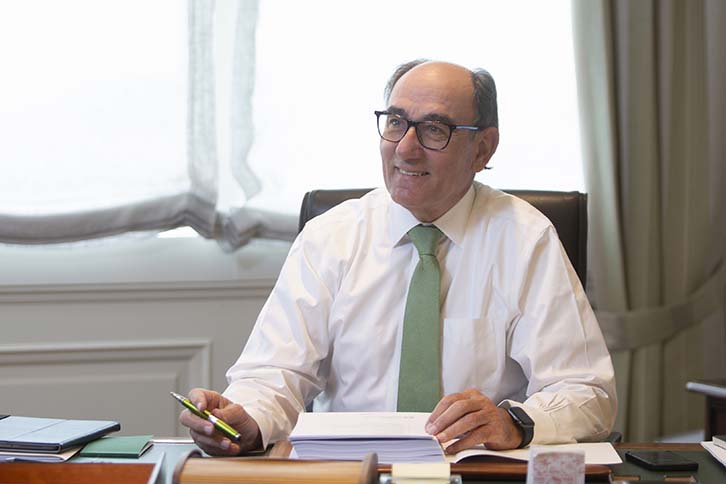
-
01/12/2022“We are ready to match your green energy ambitions,” says Iberdrola Executive Chairman Galan to UK Chancellor Green energy powerhouse Iberdrola says it will match the UK Government’s green energy ambitions and even accelerate investment if it continues with a stable energy sector framework. Ignacio Galan, Executive Chairman of Iberdrola, met UK Chancellor of the Exchequer Rt Hon Jeremy Hunt MP, and indicated the company’s readiness to invest at continued record levels if the regulatory framework supports the appetite for green infrastructure. Earlier this month Iberdrola, the global leader in renewable energy and electricity networks, outlined an upweighted €47bn capital investment plan for the next three years, with investment in the UK increasing to £10.4bn in total between 2020 and 2025. In a meeting with the Chancellor, Mr Galan said the UK had an excellent opportunity to continue its leadership in renewables and electricity networks He said: “We are willing to match the UK Government’s green energy ambitions. With a stable and predictable regulatory environment, we are ready to continue to invest at record levels. And we are even prepared to accelerate that investment if the conditions allow. “We need to approach the current energy crisis differently. It is an emergency and if there is one country in Europe that can deliver quicker on electrification it is the UK. “The UK has a great opportunity to build on its leadership position on renewables, especially offshore wind, and to cultivate the green hydrogen economy. And, of course, to continue to invest in the electricity grids that will be the backbone of bringing more renewables onto the system and helping to decarbonise transport and heat.” “I welcome the Chancellor’s engagement and made clear to him that in Iberdrola and ScottishPower, the UK Government will have a partner in lockstep with their green energy ambitions. If the Government and regulator are ready to go further on their ambitions, then we will too.” Through its ScottishPower business, Iberdrola is building one of the largest offshore hubs in UK waters in East Anglia and was one of the biggest winners in the ScotWind seabed auctions with potential for 7GW of offshore wind off the coast of Scotland. Iberdrola predicts global power demand is on course to exceed current forecasts, doubling before 2040 and its targeted three-year spending plans earmarked 57% of capital for electricity networks. Ofgem this week released its Final Determination on ScottishPower’s SP Energy Networks plans to invest more than £3bn between 2023 and 2028 in its distribution networks in central southern Scotland and north Wales, Cheshire and Merseyside. SP Energy Networks is now assessing the detail of the Final Determination. Mr Galan said: “We need the climate where regulators are pushing companies like ours to go further and go faster. The Holistic Network Design is an example of where regulators can be focused on creating the long-term conditions for investment in the critical clean, green infrastructure a country needs to electrify and break the link to fossil fuels.” READ MORE








